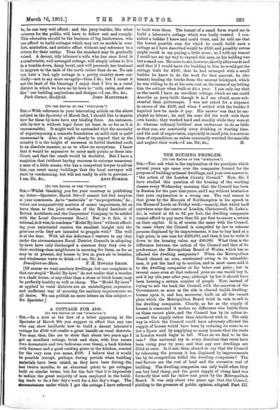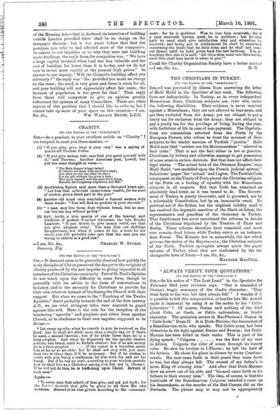THE ROUSING PROBLEM.
[TO THE EDITOR OF THE "SPECTATOR."] SIB,—You ask what is the explanation of the paralysis which several years ago came over the companies formed for the purpose of building artisans' dwellings, and your own answer is, "the action of the London County Council." Now, Sir, I have studied this question of the housing of the working classes every Wednesday morning that the Council has been in Session for the past nine years, and I say without hesitation that your explanation is a wrong one. The real reason is that given by the Marquis of Northampton in his speech in the House of Lords on Friday week,—namely, that whilst land anywhere near the centre of London, Clerkenwell, St. Luke's,
is valued at 6c1. to 9d. per foot, the dwelling companies cannot afford to pay more than 2d. per foot to ensure a return on their capital. It is, of course, the same with the Council. In cases where the Council is compelled by law to rehouse persons displaced by its improvements, it has to buy land at a high price, in one case for 2200,000; and then it has to write it down to the housing value, say 240,000. What then is the difference between the action of the Council and that of its predecessor, the Metropolitan Board of Works, which has so affected the dwelling companies ? When the Metropolitan Board cleared an area, condemned owing to its unhealthi- ness, it put the land up to auction, and in most cases sold it to the dwelling companies at far below cost price ; but in several cases even at that reduced price no one would buy it, and it lay idle year after year, although by law it should have been housing a certain number of people. Now, instead of trying to sell the land, the Council, with the sanction of the Government, as soon as the site is cleared builds dwelling- houses upon it, and has, moreover, built on all the vacant plots which the Metropolitan Board tried in vain to sell to the dwelling companies. Clearly, as far as the supply of houses is concerned it makes no difference who builds them on these vacant plots, and the Council has by its action in- creased the supply rather than interfered with it. The only way in which the Council could have adversely affected the supply of houses would have been by reducing its rents to so low a figure and by supplying so many houses that the rents in London would begin to fall. What do we find to be the case ? One universal cry in every direction that rents have been rising year by year, and that any new dwellings are filled at once. Is it not, then, absurd to say that the Council by rehousing the persons it has displaced by improvements has by its competition killed the dwelling companies ? The real factors are the cost of land and the excessive cost of building. The dwelling companies can only build when they can buy land cheap, and the great supply of cheap land was formerly that sold far below cost price by the Metropolitan Board. It was only about two years ago that the Council, yielding to the pressure of public opinion, adopted Part III.
of the Housing Act,—that is, declared its intention of building outside London provided there shall be no charge on the ratepayer thereby; but it was years before that that the paralysis you refer to had affected most of the companies. In answer to our inquiries as to why they were not building more dwellings, the reply from the companies was : "We have a large capital invested when land was leas valuable and the cost of building far lower than it is to-day, and we do not care to invest more capital at the present high prices." In answer to our inquiry," Will the Council's building affect you adversely ?" the reply MILS " No : provided you make no charge on the rates ; the need, is very great and there is room for all, and your building will not appreciably affect fair rents ; the increase of population is too great for that." That reply from those well competent to give an opinion greatly influenced the opinion of many Councillors. There are other aspects of this problem that I should like to refer to, but I cannot take up more of your space on this occasion.—I am,
Sir, 8:0., War. WALLACE BRUCE, L.C.C.







































 Previous page
Previous page